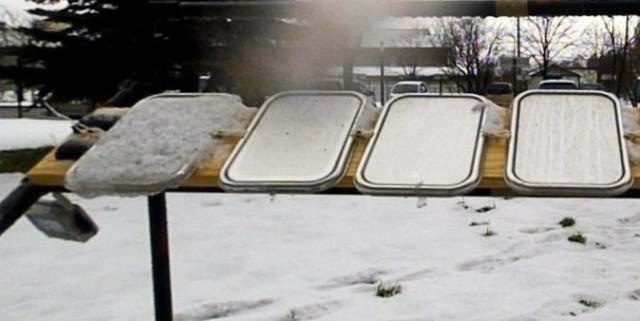Mar 18 2016
Researchers have developed a new liquid-secreting material that could make an aircraft's wings and other similar surfaces so slippery that ice would slide off easily. This latest development could make aircraft deicers a thing of the past.
 SLUGs coatings on the right three panels at a test station repel snow and ice, but snow builds up on an untreated panel (far left). (CREDIT Chihiro Urata)
SLUGs coatings on the right three panels at a test station repel snow and ice, but snow builds up on an untreated panel (far left). (CREDIT Chihiro Urata)
Before stormy weather takeoffs a deicing agent is often applied to remove ice from the wings of the aircraft, now the new material could eliminate this process. When temperatures fall below the freezing point, the slick, liquid-like substance is secreted from a film coated on the wing’s surface, but as the temperatures rise, the substance goes back into the film. This slick material is known as self-lubricating organogels or SLUGs.
The research team has presented the study at the 251st National Meeting & Exposition of the American Chemical Society (ACS). ACS is the world's largest scientific society. The expo featured over 12,500 presentations on different topics of science.
"The SLUGs technology has a host of formulations and applications, including in a gel form that can be encapsulated in a film coating on the surface of a wing or other device," says research director Atsushi Hozumi, Ph.D.
We came upon this idea when we observed real slugs in the environment. Slugs live underground in soils when it is daytime and crawl out at night. But we never see slugs covered in dirt. They secrete a liquid mucus on their skin, which repels dirt, and the dirt slides off. From this, we started focusing on the phenomenon called syneresis, the expulsion of liquid from a gel.
Chihiro Urata, Ph.D, National Institute of Advanced Industrial Science & Technology
Urata explained that the liquid-repellent substance and the gel are held in a silicone resin matrix. After curing this mixture, it is applied to a surface. This film coating is almost transparent but extremely solid. Hozumi and Urata are from the National Institute of Advanced Industrial Science & Technology (Japan).
Originally the deicing properties of different types of organogels being tested were studied under different temperature conditions, however the findings of the thermo-responsive secretion characteristics of the material was an unexpected surprise. The tests revealed that the secretion of the slick substance was reversible. As temperatures drop below the freezing point, the syneresis begins slowly, so although ice can still form, it would not be able to stick to the surface and would slide off easily. As soon as the temperature rises above the freezing point, the liquids retreat back into the film.
According to Urata, SLUGs offers immense possibilities that extend beyond aircraft applications, including antifouling coatings in paints, packaging, metal molds, ship bottoms, etc.
At present, the study is exploring other options to improve the SLUG's coating transparency.
We are planning a short-term project to apply the coating where transparency is essential. For example, we are just beginning a project to field-test the durability and visibility of SLUGs coating on signage in Japan's northern counties.
Chihiro Urata, Ph.D, National Institute of Advanced Industrial Science & Technology
The study is supported via a grant-in-aid for scientific research on new areas from the Japanese Ministry of Education, Culture, Sports, Science and Technology.